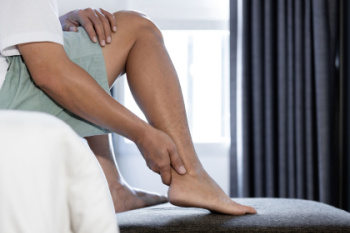
Achilles tendon injuries are common for both athletes and occasional exercisers, presenting significant challenges due to the tendon's pivotal role in mobility. Often triggered by overuse, athletes may push their limits too quickly or neglect proper stretching before physical activity. Also, factors like wearing high heels or foot issues like flat feet can heighten the risk of an Achilles tendon injury. Symptoms typically include pain along the back of the foot and above the heel, and can be worsened by ankle stretching or toe-standing. Diagnosis involves a thorough physical examination by a podiatrist, who also may order imaging tests like an ultrasound or MRI scans to assess the extent of damage. Treatment options vary based on severity and may include prescribing anti-inflammatory medication or certain exercises for rehabilitation. In severe cases or complete tears, surgery may be necessary for tendon repair. If you have injured your Achilles tendon, it is suggested that you schedule an appointment with a podiatrist for a full exam, diagnosis, and suggested treatment plan.
Achilles tendon injuries need immediate attention to avoid future complications. If you have any concerns, contact Dr. Tupper of Coshocton Foot Health Center. Our doctor can provide the care you need to keep you pain-free and on your feet.
What Is the Achilles Tendon?
The Achilles tendon is a tendon that connects the lower leg muscles and calf to the heel of the foot. It is the strongest tendon in the human body and is essential for making movement possible. Because this tendon is such an integral part of the body, any injuries to it can create immense difficulties and should immediately be presented to a doctor.
What Are the Symptoms of an Achilles Tendon Injury?
There are various types of injuries that can affect the Achilles tendon. The two most common injuries are Achilles tendinitis and ruptures of the tendon.
Achilles Tendinitis Symptoms
- Inflammation
- Dull to severe pain
- Increased blood flow to the tendon
- Thickening of the tendon
Rupture Symptoms
- Extreme pain and swelling in the foot
- Total immobility
Treatment and Prevention
Achilles tendon injuries are diagnosed by a thorough physical evaluation, which can include an MRI. Treatment involves rest, physical therapy, and in some cases, surgery. However, various preventative measures can be taken to avoid these injuries, such as:
- Thorough stretching of the tendon before and after exercise
- Strengthening exercises like calf raises, squats, leg curls, leg extensions, leg raises, lunges, and leg presses
If you have any questions please feel free to contact our office located in Coshocton, OH . We offer the newest diagnostic tools and technology to treat your foot and ankle needs.
